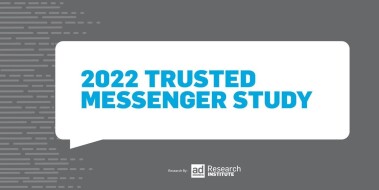(Dis)Trust in Elections Study
As a new election cycle dawns, now is the time to do the work—to educate, provide transparency and rebuild Americans’ confidence in our elections. But how do we do this? How do we identify the voters who crave more knowledge, and whose attitudes are moveable? What is causing such distrust, so we—organizations, government entities, election boards and officials—have a better understanding of how to build it back up?
Description
The Election Infrastructure Government Coordinating Council called the 2020 general election “the most secure in American history.” This reassurance by the nation’s top election security organizations, however, has done little to dissuade states from drafting (and often passing) voter suppression laws, or quell claims of widespread election fraud.
Importantly, it also failed to instill confidence in many conservative-leaning or independent voters, or to alleviate their fears and concerns about the fairness and accuracy of our country’s election process.
As a new election cycle dawns, now is the time to do the work—to educate, provide transparency and rebuild Americans’ confidence in our elections. Thus, the Campaign Legal Center (CLC) commissioned a study by the Ad Council Research Institute (ACRI) to determine Americans’ trust in the election process. Informed by a dual-phased, mixed-methods research study, ACRI and CLC targeted seven key states: Arizona, Michigan, Wisconsin, Pennsylvania, Nevada, North Carolina and Georgia.
Importantly, it also failed to instill confidence in many conservative-leaning or independent voters, or to alleviate their fears and concerns about the fairness and accuracy of our country’s election process.
As a new election cycle dawns, now is the time to do the work—to educate, provide transparency and rebuild Americans’ confidence in our elections. Thus, the Campaign Legal Center (CLC) commissioned a study by the Ad Council Research Institute (ACRI) to determine Americans’ trust in the election process. Informed by a dual-phased, mixed-methods research study, ACRI and CLC targeted seven key states: Arizona, Michigan, Wisconsin, Pennsylvania, Nevada, North Carolina and Georgia.
Key Data Points
- The key target for confidence-building efforts is conservative-leaning and independent voters.
-
Conservative-leaning and independent voters distrust the election process, but there are indicators that this audience could regain confidence over time.
- Only about a third (31%) of conservative-leaning voters in the sample believe the 2020 presidential election was conducted fairly and accurately. Another third (35%) are not very confident, and 31% are not confident at all.
- Half of independent voters (51%) were somewhat confident, with 28% not very and 18% not at all confident in the fairness and/or accuracy of the election.
- Distrust is built by multiple factors and exacerbated by a lack of knowledge.
-
Voter fraud, illegal voters, issues with counting/tallying/auditing and delays in results all contribute to building skepticism and distrust among both conservative-leaning and independent voters. These same issues are also concerns for future elections across both audiences.
During the voting process, distrust is more prevalent after one’s ballot has been cast (when votes are collected and counted, and a winner is announced). And in general, people think they know more than they actually do about the electoral process. In the quantitative survey, most voters claimed to know a fair amount or a lot about the process—despite significant evidence from qualitative research that this isn’t the case.- Top beliefs among conservative-leaning voters that contribute to distrust: voting fraud took place (74%), unregistered voters and/or undocumented immigrants1 voted (72%), encouraging multiple voting / making voting easier for some (58%).
- Top beliefs among independent voters: Encouraging multiple voting / making voting easier for some (50%), voting fraud took place (48%), unregistered voters and/or undocumented immigrants1 voted (44%).
- Three quarters (73%) of conservative-leaning voters and two-thirds (63%) of independent voters say they know a lot or a fair amount about the election process, and a further 22% of conservatives and 29% of independents say they know at least a little about the process.
- Despite the prevalence of distrust, there are reasons to be optimistic.
-
Distrust in the U.S. election process exists for voters who lean conservative and independent, so both groups should be targeted with messaging focused on building/rebuilding trust. However, despite distrust and the current divisive political climate, people still support the country and believe in the U.S., and say they plan to continue to exercise their right to vote in the future.
- 37% of conservative-leaning voters say the U.S. stands above all other countries in the world (compared to 28% of independents), and 56% of conservative voters (compared to 60% of independents) says the U.S. is one of the greatest countries in the world, along with others.
- 53% of conservatives say they are mostly proud of the U.S. (compared to 43% independents), while more independents than conservatives say they’re often both proud and ashamed of the country (47% independent vs. 43% conservative).
- 43% of conservative-leaning voters and 39% of independents say this distrust has no impact on their likelihood to vote; 38% of conservatives and 32% of independents say it makes them much more likely to vote.
Related Content

Issue Pulse
The Issue Pulse reports dive into the issues Americans care about, their values, their attitudes and behaviors relating to these issues, their views on America and American life—and if or how they change over time.
June 17, 2022

Young Voters in the 2022 Midterms
ACRI and MTVE Studios have partnered to understand young voters' motivations and potential barriers to voting through a comprehensive, multi-phase research study. Learn more and download the report.
August 5, 2022

2022 Trusted Messengers Study
The 2022 Trusted Messengers Study looks at current topics and issues to identify who Americans turn to for real, unbiased information. Learn more and download the report.
November 16, 2022
